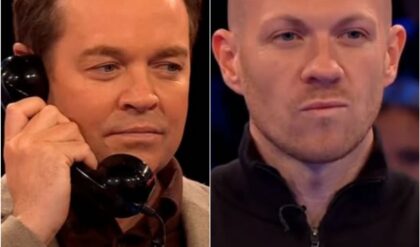King Charles demands Harry return to the UK immediately to meet face-to-face, despite having denied him several times before: ‘There’s not much time left…’
In recent discussions about the dynamics within the British royal family, intriguing insights have emerged regarding King Charles III’s feelings towards his younger son, Prince Harry. Reports indicate that the King
expresses a deep sense of longing for Harry, often referring to him affectionately as his “darling boy.” This term captures not only the familial bond between father and son but also the emotional complexities that
have surfaced in light of their tumultuous relationship over the past few years. However, the situation is made more complicated by the firm stance taken by Prince William, who is reportedly advocating for an
“absolute ban” on Harry’s participation in certain royal events. This juxtaposition between Charles’s feelings and William’s position reflects the broader challenges the royal family faces as they navigate the intricate web of personal relationships intertwined with their public roles.

King Charles’s sentiments towards Prince Harry reveal a father grappling with the emotional fallout of his son’s decisions. Harry’s choice to step back from royal duties in 2020 and relocate to California with his
wife, Meghan Markle, has had profound implications not only for him but also for the entire royal family. In light of the various public revelations, including interviews and Harry’s memoir, “Spare,” Charles’s
longing for connection illustrates a parental desire to mend a relationship that has faced significant strain. This yearning emphasizes the human aspect of royal life, reminding us that, despite their titles and responsibilities, the family experiences the same struggles and heartaches as any other.
The use of the term “darling boy” is particularly telling, suggesting that Charles holds on to fond memories of Harry from his childhood, a time when the bond between father and son may have been stronger. This affectionate language reveals a longing for those simpler moments, hinting at a desire for reconciliation and the hope that they might restore their relationship to its former closeness. For many parents, the love for their children remains steadfast, regardless of the challenges they face, and it appears that Charles is no exception. His emotional connection to Harry signifies an enduring bond, even amid turmoil.

Conversely, Prince William’s adamant insistence on an “absolute ban” concerning Harry’s participation in royal affairs illustrates the complexities of family loyalty and the pressures of maintaining the monarchy’s reputation. As the future king, William bears a unique burden, balancing his role as a brother with the responsibilities of upholding the institution of the monarchy. His position reflects a pragmatic approach, rooted in the belief that allowing Harry back into the fold, especially after the public disclosures and controversies, could undermine the stability of the royal family. This perspective is not merely about personal feelings; it is about protecting the monarchy’s integrity and public image, which have been challenged in recent years.
William’s stance can be seen as a response to the broader context of royal duties in the modern era. The royal family has faced significant scrutiny, and William’s focus on maintaining the monarchy’s reputation speaks to the challenges of public life. His insistence on boundaries may stem from a desire to create a sense of stability within the family structure, which has been rocked by internal conflict and external criticism. By establishing clear limits on Harry’s involvement, William aims to reinforce the importance of unity among working royals, emphasizing the need for a cohesive front as they navigate a rapidly changing world.

The tension between Charles’s feelings and William’s firm position also raises questions about the effectiveness of communication within the royal family. Open dialogue is crucial for resolving conflicts and misunderstandings, yet the royals have historically maintained a veil of privacy regarding their internal discussions. The inability to openly address feelings of hurt and disappointment may perpetuate the divide between family members. Charles’s longing for Harry and William’s strict boundaries may benefit from a mediated conversation that allows for healing and understanding. This communication gap underscores the complexities of their relationships, emphasizing that even within a family, navigating emotions can be fraught with difficulty.
As the royal family moves forward in this challenging landscape, the dynamics between Charles, William, and Harry will continue to evolve. The nuances of their relationships reveal that love and duty often intersect in complicated ways, particularly within the context of public life. The depth of Charles’s affection for Harry provides a glimmer of hope for reconciliation, while William’s commitment to protecting the monarchy serves as a reminder of the responsibilities that come with their royal titles.

In conclusion, the contrasting emotions expressed by King Charles III and Prince William regarding Prince Harry illustrate the multifaceted nature of familial relationships within the royal family. Charles’s affection for Harry highlights the enduring bond of a father’s love, while William’s firm stance on an “absolute ban” underscores the challenges of maintaining the monarchy’s reputation amidst personal conflicts. This complex interplay between love, duty, and public expectation exemplifies the unique struggles faced by the royal family as they navigate their roles in the modern world. The ongoing discourse surrounding their relationships invites reflection on the importance of communication, understanding, and ultimately, the hope for reconciliation as they strive to balance personal feelings with their royal responsibilities. As the family moves forward, the journey toward healing and unity remains a significant challenge, one that will continue to shape the narrative of the British monarchy for years to come.





